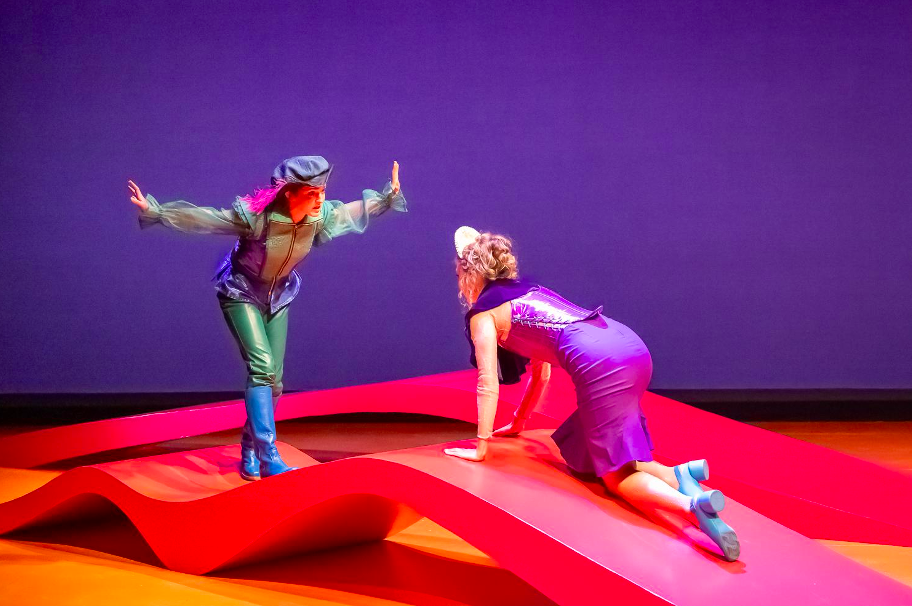The University of Massachusetts theater department’s production of “Spring Awakening: A Sin of Omission” is a pleasing new adaptation of Frank Wedekind’s 1891 play. The story revolves around a group of adolescents in provincial Germany. In a time when repression reigns, the young teens are unable to receive the necessary guidance from the adults in their lives. They are left to navigate the confusing and terrifying maze of puberty on their own. The new rendition of the classic play was led by UMass theater graduate students, director Toby Bercovici and playwright Emily Denison. The revision is much quicker paced than the original, with new twists and turns in nearly every one of the small, vignette-like scenes that make up the play. The language has been simplified from the original, without losing any of its beautiful imagery. Bercovici’s dark vision has a constant presence in the play. Her best decision is to have the same actors play the children and the adults. The children’s purity is haunted by the knowledge that they, too, will grow up to be the same repressive adults as their parents and teachers.
An attempt to distinguish adults from children was made by giving the teachers German accents. Though it added a comedic element to the play, it created inconsistency. It would have worked better if all adults had an accent. This would have helped further distinguish adults from children. Instead, the audience gets a funny, but misguided attempt at directorial creativity. Duncan Grossman plays the lead role of Melchior Gabor. A rebel among his peers, he has been given too free of a reign by his mother. The role is so rich with opportunity to create a dynamic character. It is disappointing that Grossman’s Melchior is apathetic toward nearly every other character for most of the play. Luckily, Grossman does deliver in Melchior’s most important scenes. His emotions shine through with abusive violence when faced with sex, expulsion from school and death. At first, Michael Greehan seemed no more or less than a nondescript, scholastically-challenged best friend of Melchior, Moritz Stiefel. Greehan seemed to have a general idea of his character, but trended towards over-the-top delivery that is more suitable to a musical comedy than a tragedy. However, in his final, haunting scene, the reason for the casting choice became clear. Normally, nauseating is a very negative word in a review, but not here. Greehan was so thoroughly disturbing that it was positively stomach-churning. Anneliese Nielsen is nothing short of terrific as Wendla Bergmann, the subject of Melchior’s desire. No matter if she is alone on stage or just one of the girls, Nielsen is constantly in character, reacting to her situations flawlessly and effortlessly. She is also, perhaps, the best dancer in the ensemble of actors. Other standouts in the cast include Christian Hoots and Linda Tardiff. Hoots delivered every single one of his characters fearlessly. As sex-crazed George, he tackled the controversial scene without a second thought. Hoots never backed down as the headmaster of the school. Tardiff brought a graceful timelessness to bohemian runaway, Ilse, and was fantastic as Wendla’s misguided, but good-hearted mother. A completely new concept to Wedekind’s play is the dance sequences, choreographed by Madelyne Camera. Simple stage dance was used to perfectly capture the essence of the play. As one character is about to masturbate to a picture of Desdemona from Shakespeare’s “Othello,” a dancer comes out as the object of the boy’s affection. Their dance is beautiful and disturbing at the same time. The audience knows what the teenage boy is doing, but it is never actually seen. We only see right before and right after the boy has “destroyed” the picture. Another excellent dance is a group piece. The children run out, dancing and playing, but morph into hunched over, rickety, old teachers. It serves as another excellent metaphor for the idea that the children will grow up to become these horrific beings. The only flaw is that it relied far too heavily on repetition. The makeup design by Faye Richards and Toby Bercovici is risky, but worth it. The children wear standard stage makeup. They carry around black makeup crayons, and add mustaches, monocles, moles, and other facial markings on stage, in front of the audience, rather than concealing the transformation backstage. Again, it contributes to theme of the children growing up to be repressive adults. By far, the best element of “Spring Awakening” was the wardrobe. It was clear that costume designer Faye Richards put a great deal of time and thought into the clothing for these characters. Every character wore simple, white clothes. In the beginning, they are clean white and pure. As the show goes on and the characters’ impurities are revealed, the characters wipe their adult makeup off on their clothes. The clothes become stained and impure, just like the characters that wear them. For Melchior, Moritz, and Wendla, who do not play adults, their costumes become stained red after their severely impure actions. The play’s sound design possesses both good and bad qualities. Kyle Lampe’s design is terrific, but overused. The sounds of children laughing, wind, rain, and church bells contribute to the show’s concept. However, they volume is too loud and the sounds are used far too often, distracting viewers from far more important action going on. The lighting design by Jonathan Hicks is much more suited to the play. At first, the light on children is softer, while the adults are under much harsher light. As the children are corrupted by the world, the light on them becomes more severe and frightening. “Spring Awakening” delivers enough to please an audience, but there is a great deal of room for growth.
“Spring Awakening” is playing at the Curtain Theater till March 6 at 8 p.m. with a 2 p.m. matinee on it’s final day. Student and senior tickets are $7 and general tickets are $15. Tickets can be purchased at the Fine Arts Center Box office, online at umafacweb.admin.umass.edu/Online , or by calling 545-2511 or 1-800-999-UMAS.
Alissa Mesibov can be reached at [email protected].












